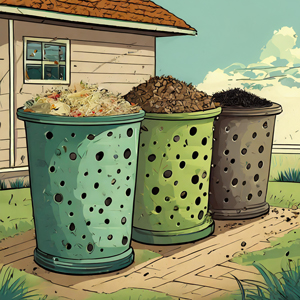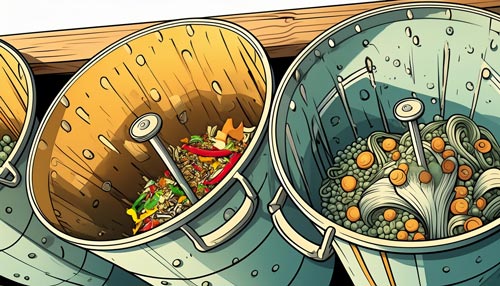
Hey there, fellow compost-enthusiasts! Composting is a fantastic way to do just that, but let’s be honest, traditional compost bins can take up a surprising amount of real estate. If you’re living in an apartment or have a postage-stamp-sized backyard, the idea of a giant compost pile might seem like a non-starter. Here’s where speed composting trash can bins comes into play.
But fear not, my space-crunched composting comrades! Speed composting comes to the rescue. It’s a fantastic option for those who want to reap the rewards of compost without needing a whole lot of room. And guess what? You can set up your very own speed composting system using something you probably already have lying around: a trusty trash can bin.
What is Speed Composting, and Why Should I Care?
Think of speed composting as the turbocharged version of regular composting. By creating the perfect environment for decomposition (think moisture, air circulation, and a balanced mix of ingredients), you can turn your food scraps into nutrient-rich compost in a fraction of the time. Traditionally, composting can take months, but speed composting can get you there in as little as a few weeks!
Setting Up Your Compact Speed Composting System: From Bin to Black Gold
Alright, it’s time to get your hands dirty (in a good way, of course!). Here’s a step-by-step guide to setting up your compact speed composting system:
- Choosing Your Battleground:
- Bin Prep:
- The Brown and Green Dream Team: Speed composting relies on a balanced mix of brown and green materials. Brown materials are like the carbon source in your compost, providing structure and bulk. Think dried leaves, shredded cardboard, or paper towels. Green materials are the nitrogen powerhouses, rich in moisture and nutrients. This includes your fruit and vegetable scraps, coffee grounds, and tea bags. Aim for a ratio of 3 parts brown to 1 part green.
Pro Tip: I keep a small container next to my cutting board to collect veggie scraps throughout the week. It makes adding them to the speed composting trash can bin a breeze!
- Let’s Get Composting! Now for the fun part: adding your kitchen scraps! Just remember to chop up larger pieces to encourage faster decomposition. Layer your browns and greens, and don’t forget to keep an eye on the moisture levels. Your compost should feel like a damp sponge. If it feels too dry, add a little water and mix it up. If it feels soggy, add some more brown materials to soak up the excess moisture.
Turning it Up a Notch: Maintaining Your Speedy Composter

Just like any good party, your compost needs a little stirring every now and then. Here’s how to keep your compact speed composter happy:
- Turning Time: Aim to turn your compost with a turning tool every few days. This aerates the pile, prevents odors, and speeds up decomposition.
- Feeding Frenzy: As your compost pile shrinks, feel free to add more browns and greens to keep the party going!
Troubleshooting Tips: When Compost Happens
Even the most seasoned composters encounter occasional hiccups. Here are some solutions to common speed composting problems:
- Fruit Fly Frenzy: Fruit flies love the sweet smells of your compost. To deter them, try burying your food scraps under a layer of brown materials or add a breathable lid to your bin.
- Odoriferous Oops: If your compost starts smelling a bit funky, it’s likely lacking oxygen or has too much moisture. Add more brown materials for better aeration, or turn the compost more frequently.
Harvesting the Rewards: Using Your Finished Compost
Congratulations! After a few weeks of dedicated composting, you should have a batch of beautiful, dark brown, crumbly compost ready to use. Here’s how to tell if it’s finished:
- The Look Test: Your compost should have a rich, earthy smell and a dark brown color.
- The Touch Test: It should feel crumbly and cool to the touch.
Now, the best part: using your homegrown compost! Enrich your houseplant soil, give your garden beds a nutrient boost, or share your compost wealth with fellow plant enthusiasts. The possibilities are endless!
Beyond the Basics: Speed Composting Hacks
Feeling like a composting pro? Here are a few bonus tips to take your speed composting skills to the next level:
- Chop it Up: The smaller your food scraps, the faster they’ll decompose. Break down larger pieces before adding them to your bin.
- Compost Thermometer: While not essential, a compost thermometer can help you monitor the temperature of your compost pile. Ideally, you want it to reach around 130-160°F (54-71°C) for optimal decomposition.
The Final Word: Embrace the Speed Composting Revolution
Speed composting with compact trash can bins is a fantastic way to turn your limited space into a composting powerhouse. It’s fast, efficient, and requires minimal effort. So, ditch the excuses, grab your trusty bin, and start turning your kitchen scraps into black gold for your plants. Remember, even small steps can make a big difference when it comes to reducing waste and creating a more sustainable future. Happy composting!
More Tools of the Trade
Composting Links:
United States Composting Council
EPA’s composting page
Cornell University Composting
The Compost Council